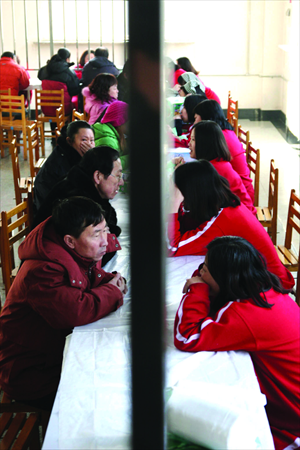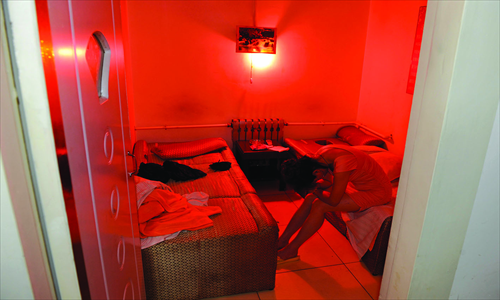House of sin

Relatives visit inmates at the custody and education center during an open day in Shenyang, Liaoning Province, on January 12, 2007. Photo: CFP
Prostitution, which is illegal in China, can incur administrative penalties such as detention and fines, but prostitutes and their clients can also receive a mandatory confinement of up to two years.
Implemented 20 years ago, the "custody and education" (C&E) system purportedly aims to help prostitutes or their clients "eliminate their bad habits and turn over a new leaf" through education, labor and medical treatment of sexually transmitted diseases (STDs).
Yue, in her 30s, who was forced into custody in Tianjin in 2012, told the Global Times that the inmates "lived like dogs" and the system was characterized by strict rules, bad food, verbal abuse and dreary manual work.
Many ex-inmates and activists say the prison-style asylum is more like a profit-oriented factory run by public security organs using forced labor.
With the country's abolishment of the "re-education through labor" system in November last year, many lawmakers, lawyers and STD experts believe that it is high time the similarly flawed C&E system was brought to an end.

A sex worker is apprehended during a police crackdown on prostitution at Dingfu Jiayuan community in Beijing, June 21, 2011. Photo: CFP
Early days
China banned prostitution when the People's Republic was founded. But the trade, after being virtually eradicated for decades, boomed following the reform and opening up in the 1980s. Following a nationwide crackdown, some cities like Shanghai and Beijing piloted C&E centers.
In 1991, the standing committee of the National People's Congress officially endorsed the system, allowing prostitutes and their clients to be placed in police custody for six months to two years in a bid to "educate, influence and save" them.
Many more such centers were then built throughout the country. In 1993, the State Council issued a document stipulating that inmates or their relatives would have to shoulder living and medical costs themselves.
But legal experts say the system is no longer viable. According to the Legislation Law adopted in 2000, measures and penalties involving restriction of citizens' freedom must be governed by law.
"But the measures and decision are not laws," Liu Wei, a lawyer who has been involved in AIDS control and prevention cases for years in Beijing, told the Global Times.
Furthermore, the Law on Penalties for Administration of Public Security prescribed a 10 to 15-day detention and a fine of no more than 5,000 yuan ($826) on adults buying or selling sex, and doesn't mention custodial sentences at all, she noted.
Liu Renwen, a law professor from the Chinese Academy of Social Sciences, agreed. "Under the system, police officers have absolute power on who is detained and the length of the detention. They are both players and referees, which easily breeds corruption," Liu told the Global Times.
However, Yue said that freedom can be bought. She claimed she was released after three months in custody after paying 50,000 yuan, nearly all of her savings, to a police officer.
There are two stages that a suspect goes through before entering the C&E system once he or she is detained: interrogation in a police station within 24 hours and up to 15 days in detention if the offense is confirmed.
"But if his or her relatives or friends use connections and pay bribes immediately, he or she can be released within 24 hours without any offenses being recorded," Yue said.
The price tag for quick release is usually 30,000 yuan, but can reach as much as 50,000 yuan to stop a detainee from being sent to a C&E center, she stated.
Ineffective measure
A December report issued by Asia Catalyst, a non-profit organization based in New York City that focuses on health and human rights in East and Southeast Asia, criticized the system for doing little to eradicate prostitution but instead increasing the financial burden on lower-tier sex workers.
The report, in which 30 female sex workers were interviewed, found that commodity prices inside the centers were two to three times higher than normal market price.
Inmates seldom receive useful technical training, according to the interviewees, but work up to nine hours a day doing manual jobs such as making toys, wrapping disposable chopsticks and peeling garlic.
The reward for their labor was not payment, but points accumulated, which, in theory, could be exchanged for early release.
Everything is done strictly according to schedule, even going to the toilet.
Male inmates are separated from female ones. In the two-story building where Yue lived, there were about 250 inmates, with 12 to 15 people to a room, Yue recalled.
"The meals were simple: rice that had been stocked for many years and old vegetables. There was food like cooked meat and sausage, but you had to pay for it," she said.
There were also other irregularities.
Legal Mirror reported in December that a C&E center in Tianjin charged 200 yuan for a visit to detainees, but gave no reason for the fee. Visitors could not bring gifts but had to buy them in the center's store at much higher prices.
Liu Yueguo, a former official from Liaoning Province Public Security Bureau, revealed to media that to meet the quota for C&E inmate numbers and fines, some police even engaged in entrapping suspects.
The authorities have not published any related statistics on these centers, but a 2005 thesis from a journal of the People's Public Security University of China showed that there were 200 C&E centers that could hold 40,000 people.
Many regions like Liaoning and Shandong issued new rules saying that first offenders or single parents could not be sent to C&E centers, but enforcement is poor.
Yue said she was detained when her daughter was only 4, forcing her into the care of her old and visually impaired mother.
But the fundamental issue is that the system has failed to turn these people around, experts said. The Asia Catalyst survey found that all the 30 female sex workers it interviewed went back to their trade after being released.
"Without offering them any technical skills, relief funds or jobs, they had to return," Pan Suiming, director of the Institute of Sexuality and Gender at Renmin University of China, told the Global Times, noting that sex workers are mostly forced into the industry due to poverty and poor education.
Pan said the system has not affected the sex industry. The World Health Organization estimated in 2010 that China has up to 6 million sex workers and that the commercial sex industry has rapidly expanded in the past decade.
"To quickly pay back the money they borrowed for bribes and costs in custody, many have to sell their bodies cheaper," Ye Haiyan, founder of the China Grassroots Women's Rights Center, told the Global Times.
Gao Zicheng, a lawyer and a deputy to the Beijing Municipal People's Congress who has called for the system to be abolished, said C&E detention is even harsher than public surveillance, criminal detention or short-term imprisonment.
"Public surveillance (three months to two years for minor offences) can be enforced at home, which is freer than restricting a person at a detention center," Gao told the Global Times.
Some also worry that the C&E system can be illegally used by local authorities to "punish troublemakers."
Early on December 26, 2011, police stormed into the house of Xian Yaojun in Xiancun, a village in Guangzhou, Guangdong Province, and took Xian away. Xian's residence was a "nail house," so called because he had refused orders to vacate it for demolition. The police claimed that a prostitute confessed that Xian paid for sex from her one month earlier, then placed him in a C&E center for 22 months. Han insisted the charges were trumped up, Southern People Weekly reported.
Weeks later, Lu Haichuan, from another nail house in the village, was detained and similarly penalized for soliciting prostitutes. After nearly one year in custody, the two signed a demolition agreement and were released in late 2012 for "good behavior."
Muted outrage
Though similarly problematic, voices calling for an end to the C&E system are much smaller than those seeking to abolish the "re-education through labor" system.
"There are many more people engaged in the latter system. Besides, prostitutes are at a moral disadvantage. The people involved dare not oppose the system openly and loudly," Liu Renwen said. But realizing the system's irrational nature, some authorities have already reduced or even shut down the centers, he noted.
Yu Mingyong, vice president of Guangzhou Intermediate People's Court and Xiao Zhixiong, the court's administrative tribunal head, also admitted the system was outdated. The number of people sent to C&E centers has been shrinking and the system will finally die, the two agreed in an interview to New Express in December.
Some also started to challenge the system. Recently, Yu's court made public a case it heard between Guangzhou police and a man surnamed Pan who was ordered to spend six months in a C&E center after a 15-day detention for soliciting prostitutes.
Pan won the case and the C&E sentence was withdrawn due to a lack of solid proof.
Some C&E centers have tried to be helpful. In a recent report, the Ningbo C&E Center in Zhejiang Province claimed that they even invited enterprises to hold on-site recruitment and that it had successfully turned more than 8,000 women around in the past 22 years.
Experts say the C&E system should be replaced by the community correction system to offer free healthcare and training to sex workers.
"But the community-based service should be conducted on the basis of willingness, equality and kindness," Ye stressed.